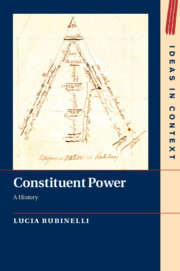Book contents
- Constituent Power
- Ideas in Context
- Constituent Power
- Copyright page
- Dedication
- Contents
- Acknowledgements
- Introduction
- Chapter 1 Sieyès and the French Revolution
- Chapter 2 Constitutional Politics in Nineteenth-Century France
- Chapter 3 The Weimar Republic
- Chapter 4 Constitutional Politics in Post–World War II Europe
- Chapter 5 Arendt and the French Revolution
- Conclusion
- Bibliography
- Index
- Ideas In Context
Chapter 3 - The Weimar Republic
Published online by Cambridge University Press: 28 April 2020
- Constituent Power
- Ideas in Context
- Constituent Power
- Copyright page
- Dedication
- Contents
- Acknowledgements
- Introduction
- Chapter 1 Sieyès and the French Revolution
- Chapter 2 Constitutional Politics in Nineteenth-Century France
- Chapter 3 The Weimar Republic
- Chapter 4 Constitutional Politics in Post–World War II Europe
- Chapter 5 Arendt and the French Revolution
- Conclusion
- Bibliography
- Index
- Ideas In Context
Summary
Carl Schmitt theorised constituent power as the democratic embodiment of sovereignty. Schmitt’s collapse of constituent power and sovereignty is well known, but I suggest that he did not simply take the two ideas to be interchangeable. Rather, he aimed to introduce a meaning for popular power that could be consistent with his definition of sovereignty as the power to decide on the exception. This was not provided by ideas of national and popular sovereignty. The former gave birth to liberal parliamentarianism, which he accused of dissolving the essence of sovereignty; the latter encouraged direct and local democracy, which prevented the prompt expression of the sovereign will. By contrast, Schmitt found in Sieyès’s idea of constituent power a way to associate the extraordinary character of his account of sovereignty to the democratic principle of popular power. He thus presented constituent power as the meaning of sovereignty in democratic states. On his interpretation of Sieyès’s theory, constituent power belonged to the nation but, to be exercised, needed to be represented by a unitary figure, elected through plebiscites and able to embody the unity of the nation acting as a unitary instance of decision: the sovereign dictator. The result is a complete reversal of Sieyès’s theory.
- Type
- Chapter
- Information
- Constituent PowerA History, pp. 103 - 140Publisher: Cambridge University PressPrint publication year: 2020
- 1
- Cited by



